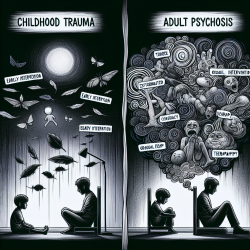Personality disorders have long intrigued both clinicians and legal professionals due to their complex nature and the challenges they pose in forensic settings. The research article "Personality disorders at the interface of psychiatry and the law: legal use and clinical classification" provides valuable insights into how these disorders are perceived in both clinical and legal contexts. This blog aims to guide practitioners in improving their skills by implementing research outcomes or encouraging further exploration of this intricate topic.
The Complex Relationship Between Personality Disorders and the Law
The relationship between personality disorders and the legal system is multifaceted, reflecting the complexity of these disorders within clinical and research communities. The article highlights that personality disorders are not generally accepted as significant mental illnesses within the legal system due to several reasons:
- High incidence of personality dysfunction in criminal populations.
- Frequent comorbidity with other disorders, complicating causation determination.
- Difficulties in defining when personality traits become pathological.
This perception is mirrored by the clinical view that personality disorders are often seen as less severe than other mental illnesses, not likely to change, and typically under volitional control. As a result, they are not prioritized for special consideration within medical or psychiatric resource allocation.
Clinical Implications for Practitioners
For practitioners working in forensic psychiatry or related fields, understanding the nuances of personality disorders is crucial. Here are some ways practitioners can enhance their skills:
- Stay Informed: Regularly update your knowledge on the latest research and classification systems like DSM-5. Understanding both categorical and dimensional approaches can provide a broader perspective on diagnosis.
- Engage in Multidisciplinary Collaboration: Work closely with legal professionals to understand how personality disorders are perceived in different legal contexts. This collaboration can improve the quality of expert testimony and case assessments.
- Utilize Reliable Assessment Tools: Employ validated psychological measures such as the Millon Clinical Multiaxial Inventory (MCMI) and Hare Psychopathy Checklist-Revised (PCL-R) for comprehensive evaluations.
- Focus on Risk Assessment: Given the association between certain personality disorders and violence risk, practitioners should emphasize risk assessment in their evaluations to inform legal decisions effectively.
The Legal Perspective
The legal system often relies on established classification systems for mental disorders to inform decisions. However, it also has its own criteria for what constitutes a mental illness. Practitioners should be aware of these differences to provide accurate assessments that align with legal standards.
The law tends to view mental illness as an explanation or mitigating factor rather than an excusing condition. Therefore, understanding how personality disorders fit into this framework is essential for providing effective expert testimony.
Encouraging Further Research
The ongoing debate about whether personality disorders should be defined categorically or dimensionally highlights the need for continued research. Practitioners are encouraged to contribute to this field by conducting studies that explore new diagnostic approaches or investigate the neurochemical and genetic aspects of these disorders.
By staying informed and actively participating in research, practitioners can help shape future classifications and improve the integration of personality disorder assessments within both clinical practice and legal proceedings.
To read the original research paper, please follow this link: Personality disorders at the interface of psychiatry and the law: legal use and clinical classification.










